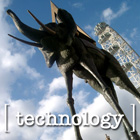
|
||||||||
|
GATES ANNOUNCES PLANS TO REPLACE PAPER WITH SILICON Bill Gates, founder of Microsoft, is busy dreaming of new inroads (into your everyday life) for his company as computer technology becomes faster, cheaper, more ubiquitous. He told a London audience that the static format of paper would be replaced by paper-thin digital wireless devices which would be constantly downloading huge amounts of information from the internet. He predicted we would all be connected all the time, within 10 years. According to the Guardian newspaper, Gates noted "In some ways the computer just disappears into the environment. All these devices will be hooked up to the internet and the internet will not have any speed limitations." It is important to note that computer power and speed have not only multiplied at incredible rates in recent years, but as Gates noted, superfast wireless connection speeds may spur an even faster rate of growth and innovation. For anyone who has seen the film Minority Report, the "devices" Mr Gates refers to will not be entirely unfamiliar: in that film, a fugitive Tom Cruise struggles to stay out of sight as the digital newspapers around him (strikingly similar to current newsprint in format, flexibility and heft) are updated, showing the urgent alert that he is dangerous and on the run. At MIT, near Boston, Dr Joseph M. Jacobson, along with Barrett Comiskey, Patrick Anderson, and Leila Hasan, are working on the development of "electronic paper", and they have some footage to show they're making progress toward paper which contains chemically "microencapsulated pixels", and is digitally programmable, like a basic version of today's computer screens. But Mr Gates is much more ambitious than just planning to take advantage of such novel media opportunities: he is also planning to reconstruct the entire world in 3D digital graphics. Again, the Guardian reports "Microsoft was spending 'hundreds of millions of dollars' creating a detailed photo-realistic 3D map of the world, he said, allowing anyone to virtually experience being anywhere else on earth." The purpose of such a project is unclear, or why, for instance, it would be worth "hundreds of millions of dollars" at the present moment, but the nature of Gates' ruminations is less so: he wants to position Microsoft to be at the heart of everything people do. He wants his company to have a say in whether your cell phone gives you GPS readouts, translates signs as you snap a photo of them, or can locate your nearby friends without their knowing you're out looking for them. Gates predicts intense user-empowerment from digital wireless technology, and envisions the web as the biggest, fastest computing platform possible. His predictions of a future where "self-authored" content competes with prime time and where television is an entirely personalized experience, are based on that premise. And Microsoft is not the only company working to take advantage of this new reality. Apple's new iPod gadgets, one a Motorola phone running iTunes (for wireless downloads anywhere), another an updated version of the original now with video capacity, indicate that Cupertino, CA, also sees over the wireless horizon. The company's iLife software package is a sort of personal/creative suite of information sorting and organization that does for entertainment what Office does for work. And of course the Finns have been able to charge vending-machine items to their mobile phones for nearly a decade (that technology arrived via Nokia in the US in 1998). One fundamental thing to consider, though, is what proof we will leave for future anthropologists that our society was highly cultured, if all our information goes digital. Paper still gives us the vital benefit of permanent compatibility, something no presently existing software platform even contemplates. [For more: Guardian]
RELATED MATERIALS The State Department has announced it will introduce new passports with electronic features such as Radio Frequency IDentification chips, intended to match information stored on these chips to the bearer's physical appearance, and to other information. Privacy advocates say the move is a giant leap toward a state of totalitarian interference in citizens' movements and personal information. [Full Story] IS YOUR CEREAL BROADCASTING? How much do you know about your cereal, and how much does it know about you? What about your money, your passport, your boarding pass? These are just some of the items in your personal sphere which may soon be broadcasting radio frequencies, testifying to your habits and your movement. RFID, or Radio Frequency IDentification technology, is the reason why. [Full Story] |
|||||||
|
||||||||
